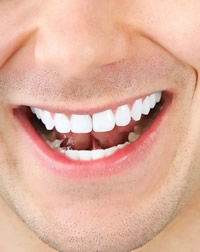
By James Dunphy
 Tooth whitening has taken the world by storm, but whitening methods have been in use in various forms for hundreds of years. A bright, white smile has long been associated with good health, wealth, status and success and people have tried a number of different methods to get a lighter, whiter smile, but which is best, it it worth shelling out for professional treatment or are traditional methods, such as oil pulling safer and more cost-effective?
Tooth whitening has taken the world by storm, but whitening methods have been in use in various forms for hundreds of years. A bright, white smile has long been associated with good health, wealth, status and success and people have tried a number of different methods to get a lighter, whiter smile, but which is best, it it worth shelling out for professional treatment or are traditional methods, such as oil pulling safer and more cost-effective?
What is oil pulling?
Oil pulling, also known as oil swishing, is an ancient natural remedy, which is mentioned in Ayurvedic texts that date back 5,000 years; the belief is that using oil reduces the risk of oral health problems, as well as systemic illnesses, such as diabetes and asthma.
The process of oil pulling is very simple; you simply swish oil around the mouth, moving it from side to side to ensure that the oil reaches all areas of the mouth. Experts recommend swilling for around 15 minutes and then spitting the oil out. Sesame, coconut and sunflower oils are the most commonly used.
Does oil pulling whiten the teeth?
People who support the use of oil pulling claim that the method can whiten the teeth; swilling the oil around the mouth is also said to reduce inflammation and decrease the number of harmful bacteria in the mouth, as well as lightening the shade of the teeth. The movement of swishing the oil around stimulates the production of bacteria, causing toxins and poisons to be absorbed through the mucous membranes in the mouth. The oil pulling process destroys bacteria and prevents the build-up of plaque, which can lead to tooth staining.
There is a great deal of debate over the efficacy of oil pulling, as with many natural remedies; some people claim that their teeth look much whiter after swilling with oil, while others claim that they notice no difference after oil pulling for a period of time.
There is a great deal of debate over the efficacy of oil pulling, as with many natural remedies; some people claim that their teeth look much whiter after swilling with oil, while others claim that they notice no difference after oil pulling for a period of time.
Oil pulling has been shown to decrease the number of harmful bacteria, including streptococcus mutans, in the mouth and this may help to prevent staining caused by plaque, but the oil does not contain a whitening agent and therefore there must be limits as to the aesthetic results you can expect to achieve.
Other whitening options
There are many other whitening options, including whitening toothpaste, at-home treatments and professional whitening systems, which are offered by dentists. Studies have cast doubts over the efficacy of whitening toothpaste, but professional whitening systems can be very effective, although the results do not last forever. Whitening treatment is generally considered by dentists to be very safe and effective, provided that the treatment is administered by a trained dental professional.
Is it worth trying oil pulling then?
This is a difficult question to answer! If you read up on oil pulling, you will see that opinion is split and there are people who praise it and those that say it’s a complete waste of time. If you’re looking for a sure-fire means of whitening your teeth, you are probably better off investing in a professional dental session. It is also worth noting that there is not a huge amount of research out there to back up the efficacy of oil pulling and it based on ancient Indian folklore, rather than being a method promoted by people who have training and qualifications in medicine and dentistry. It’s also not the most enticing prospect to have to swill oil in your mouth for 15 minutes before you brush your teeth.
– James Dunphy writes on the topics of dental and psychological care. He currently is working with a Manchester based cosmetic dentist educating readers on tooth whitening as part of a full smile makeover.
